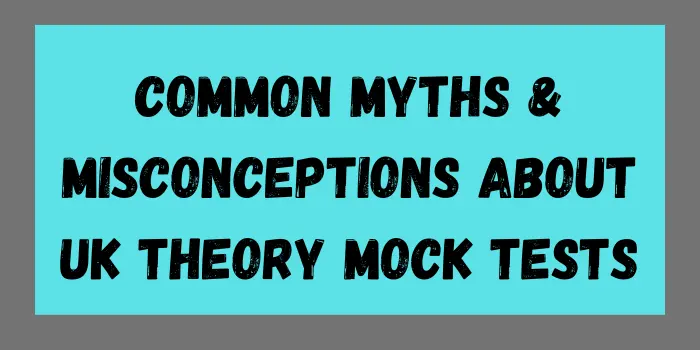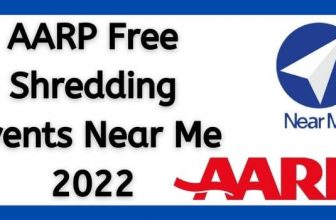
The UK theory mock test is an essential step on the journey to obtaining a driver’s license, and it plays a significant role in ensuring road safety. While mock tests are a valuable tool for preparing for the actual theory test, there are several myths and misconceptions surrounding them that can affect candidates’ preparation and confidence. In this article, we will address and debunk some of the common myths and misconceptions about UK theory mock tests, providing clarity and guidance for those aiming to pass their theory test successfully.
Myth 1: “Mock Tests Are Exactly Like the Real Theory Test”
One of the most prevalent misconceptions about mock tests is that they are identical to the actual theory test. While mock tests aim to simulate real test conditions and closely replicate the format, they are not the same. Mock tests are created by various organizations and individuals and may not always perfectly match the content and questions of the official theory test.
Reality: While mock tests can help candidates become familiar with the test format, they may not cover all possible questions or updates to the official theory test. It’s crucial to use official DVSA (Driver and Vehicle Standards Agency) mock tests for the most accurate representation of the real test.
Myth 2: “I Can Pass the Theory Test by Just Taking Mock Tests”
Some candidates believe that by repeatedly taking mock tests, they can pass the actual theory test without any additional preparation. Mock tests are indeed a valuable practice tool, but they should be used as part of a comprehensive study plan that includes reading the driver’s handbook and understanding the underlying concepts.
Reality: While mock theory test help assess your readiness and improve your test-taking skills, they should complement, not replace, the fundamental study of road signs, traffic rules, and safe driving practices. A well-rounded approach includes reading the driver’s handbook and using mock tests for practice and assessment.
Myth 3: “Mock Test Scores Are Indicative of My Real Test Performance”
Candidates sometimes assume that their scores on mock tests accurately predict how they will perform on the actual theory test. However, mock test scores do not account for factors like test-day stress, the specific set of questions on the real test, or the experience of sitting for the official exam.
Reality: While mock test scores provide a general assessment of your knowledge, they are not a guarantee of your performance on the actual theory test. The real test can have variations in question difficulty and topic distribution, so it’s essential to be fully prepared.
Myth 4: “I Only Need to Practice Hazard Perception on Mock Tests”
The hazard perception test is a crucial component of the UK theory test, and candidates often focus their mock test practice solely on this section, assuming that it will guarantee success. However, it’s essential to study all aspects of the theory test, including road signs and traffic rules.
Reality: Focusing solely on hazard perception is not enough. A comprehensive understanding of road signs, traffic regulations, and other aspects of the theory test is essential. Practicing all sections of the test ensures a well-rounded preparation.
Myth 5: “I Can Pass the Theory Test Without Knowing Road Signs”
Some candidates believe they can pass the theory test without understanding road signs, as they think these signs are intuitive and self-explanatory. This misconception can lead to neglecting the study of road signs and their meanings.
Reality: Road signs are a fundamental part of the theory test, and understanding them is crucial for safe and responsible driving. Ignoring road signs can lead to serious misunderstandings on the road, posing risks to the driver and other road users.
Myth 6: “I Can Use Any Mock Test Resource; They’re All the Same”
Not all mock test resources are created equal. Some candidates assume that any mock test resource they find, whether it’s an app, website, or book, is equally effective. However, the quality and accuracy of mock tests can vary significantly.
Reality: It’s essential to use reliable and official DVSA mock tests to ensure you are practicing with accurate questions and test formats. Official mock tests are more likely to closely match the content and structure of the real theory test.
Myth 7: “I Should Only Take Mock Tests Close to My Test Date”
Some candidates delay taking mock tests until a few days or weeks before their actual theory test. They believe that taking mock tests too early will not benefit them or that they should focus on other aspects of preparation first.
Reality: Mock tests should be integrated into your preparation from the beginning. Early practice allows you to identify areas where you need improvement, set a baseline for your knowledge, and progressively build your skills. Mock tests should be an ongoing part of your study routine.
Myth 8: “The Passing Score on Mock Tests Is the Same as the Real Test”
Candidates may assume that the passing score on mock tests is the same as the real theory test. While the passing score for the official theory test is consistent, mock tests can have varying scoring criteria depending on the source.
Reality: The passing score for the official theory test is consistent and set by the DVSA. However, mock tests may have their scoring systems, and it’s essential to understand their specific criteria. Do not rely solely on mock test scores to gauge your readiness.
Myth 9: “Once I Pass a Mock Test, I’m Guaranteed to Pass the Real Test”
Passing a mock test can provide a sense of accomplishment and confidence, which is a positive aspect of preparation. However, candidates should not assume that passing one or more mock tests guarantees success in the actual theory test.
Reality: Passing mock tests is an excellent indicator of your progress, but it does not guarantee success on the real test. The real test may include different questions, variations in difficulty, and test-day factors that mock tests cannot replicate.
Myth 10: “I Don’t Need to Review Incorrect Answers on Mock Tests”
Some candidates may skip reviewing their incorrect answers on mock tests, assuming that they understood the material and made a simple mistake. However, reviewing incorrect answers is an essential part of the learning process.
Reality: Reviewing incorrect answers helps identify gaps in knowledge and reinforces the correct information. Understanding why an answer was wrong can prevent the same mistake in the future and improve overall knowledge.
Conclusion
Addressing common myths and misconceptions about UK theory mock tests is essential for helping candidates prepare effectively and confidently for their theory test. While mock tests are valuable tools for practice and assessment, it’s crucial to use them as part of a comprehensive study plan that includes reading the driver’s handbook, understanding road signs and traffic rules, and practicing all sections of the theory test. By dispelling these myths and misconceptions, candidates can approach their theory test preparation with a clear understanding of the test’s requirements and a higher chance of success.





